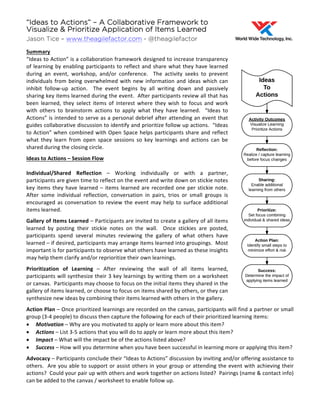Ideas To Actions - Overview
- 1. “Ideas to Actions” – A Collaborative Framework to Visualize & Prioritize Application of Items Learned Jason Tice – www.theagilefactor.com - @theagilefactor Summary “Ideas to Action” is a collaboration framework designed to increase transparency of learning by enabling participants to reflect and share what they have learned during an event, workshop, and/or conference. The activity seeks to prevent individuals from being overwhelmed with new information and ideas which can inhibit follow-up action. The event begins by all writing down and passively sharing key items learned during the event. After participants review all that has been learned, they select items of interest where they wish to focus and work with others to brainstorm actions to apply what they have learned. “Ideas to Actions” is intended to serve as a personal debrief after attending an event that guides collaborative discussion to identify and prioritize follow up actions. “Ideas to Action” when combined with Open Space helps participants share and reflect what they learn from open space sessions so key learnings and actions can be shared during the closing circle. Ideas to Actions – Session Flow Individual/Shared Reflection – Working individually or with a partner, participants are given time to reflect on the event and write down on stickie notes key items they have learned – items learned are recorded one per stickie note. After some individual reflection, conversation in pairs, trios or small groups is encouraged as conversation to review the event may help to surface additional items learned. Gallery of Items Learned – Participants are invited to create a gallery of all items learned by posting their stickie notes on the wall. Once stickies are posted, participants spend several minutes reviewing the gallery of what others have learned – if desired, participants may arrange items learned into groupings. Most important is for participants to observe what others have learned as these insights may help them clarify and/or reprioritize their own learnings. Prioritization of Learning – After reviewing the wall of all items learned, participants will synthesize their 3 key learnings by writing them on a worksheet or canvas. Participants may choose to focus on the initial items they shared in the gallery of items learned, or choose to focus on items shared by others, or they can synthesize new ideas by combining their items learned with others in the gallery. Action Plan – Once prioritized learnings are recorded on the canvas, participants will find a partner or small group (3-4 people) to discuss then capture the following for each of their prioritized learning items: • Motivation – Why are you motivated to apply or learn more about this item? • Actions – List 3-5 actions that you will do to apply or learn more about this item? • Impact – What will the impact be of the actions listed above? • Success – How will you determine when you have been successful in learning more or applying this item? Advocacy – Participants conclude their “Ideas to Actions” discussion by inviting and/or offering assistance to others. Are you able to support or assist others in your group or attending the event with achieving their actions? Could your pair up with others and work together on actions listed? Pairings (name & contact info) can be added to the canvas / worksheet to enable follow up.
- 2. “Ideas to Actions” – A Collaborative Framework to Visualize & Prioritize Application of Items Learned Jason Tice – www.theagilefactor.com - @theagilefactor Ideas to Actions - Worksheet Item 1 Item 2 Item 3 Item Learned Summarize each key item learned that you seek to apply? Motivation Why are you motivated to learn more about or apply this item? Action Plan List 3-5 steps or activities you will do to learn more about or apply this item? Impact What will the impact of these actions be? Success How will you know if you are successful?


